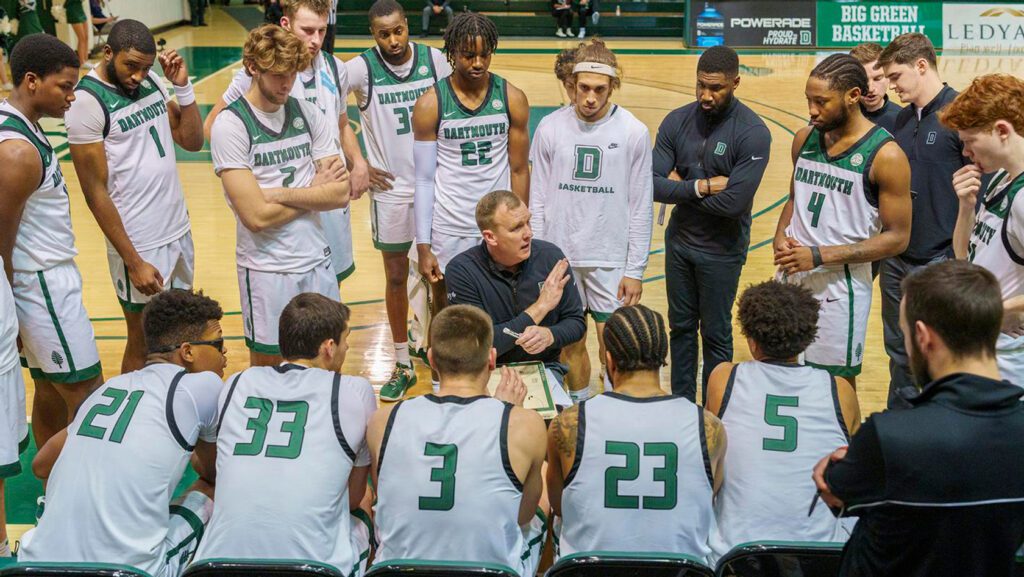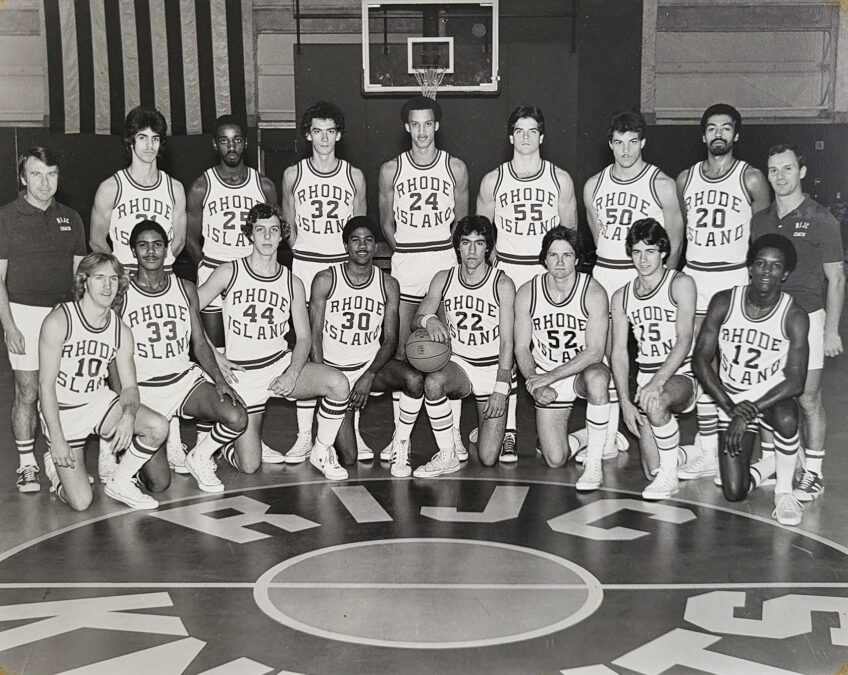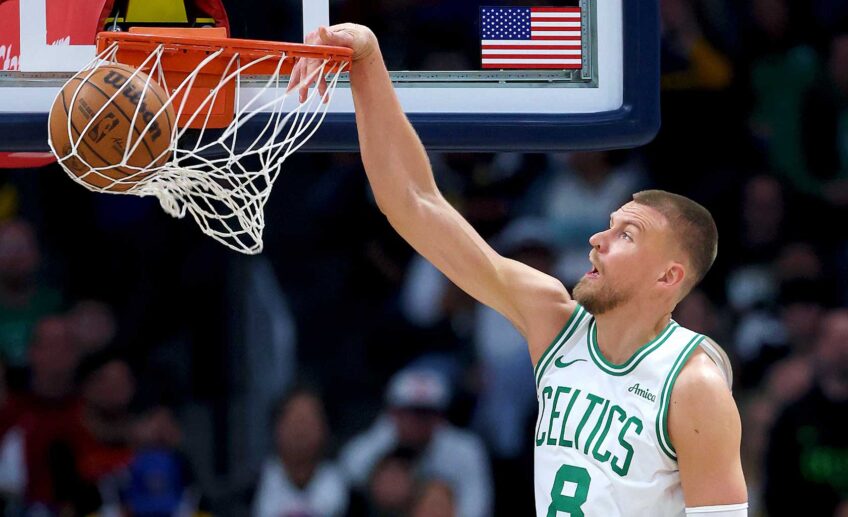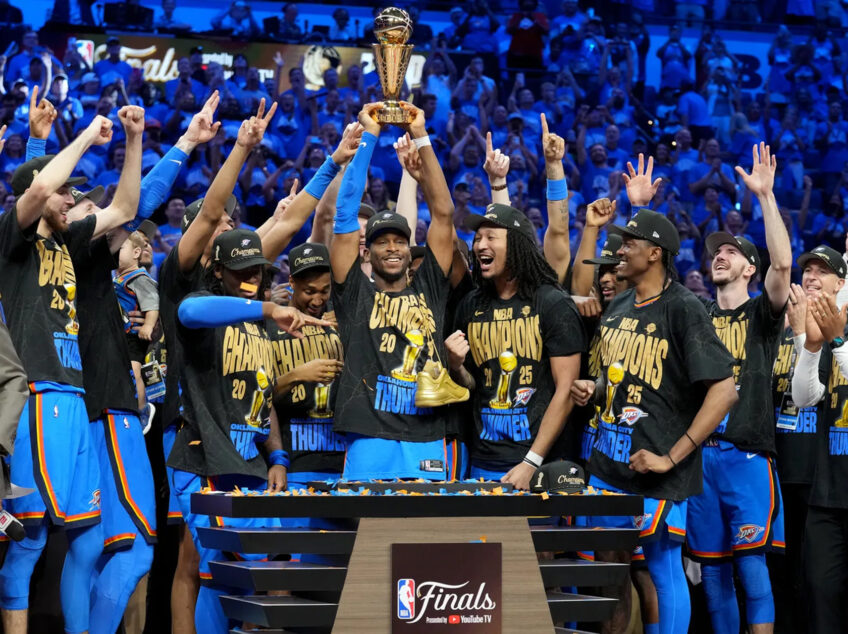
Banner Sports Sponsored by Cruz Companies
As Dartmouth’s men’s basketball players take steps to become the nation’s first unionized college athletes, observers are weighing the potential impact on the decades-long movement to classify collegiate-level athletes as employees.
Robert McRae III, a Dartmouth senior guard from Inglewood, California, told New Hampshire Public Radio he commended his teammates for supporting each other following the 13-2 unionization vote March 5 — and then beating Harvard that same day.
“To be able to go out there and vote today, and do what we did and technically make history, and then come in here today and get the win and still be focused for that, is huge,” said McRae, who attended Kimball Union Academy in Plainfield, New Hampshire.
Dartmouth College trustees are appealing a Feb. 5 ruling by National Labor Relations Board Regional Director Laura Sacks, who found the men’s basketball players at the college are employees under federal labor law. The NLRB’s jurisdiction is limited to private employers, and the February ruling only applied to the Dartmouth team.
But if federal courts uphold the unionization push, or more teams try to unionize, the ruling could prove monumental for collegiate athletes — particularly for Black students, who make up over 40% of NCAA men’s basketball and football rosters and have often led calls for pay and better treatment despite facing backlash.
“Racially, for decades now, there’s been an overrepresentation of Black athletes in college on football and men’s basketball teams across the country —the highest revenue-generating sports,” said Joseph Cooper, endowed chair of sports leadership and administration at University of Massachusetts-Boston.
“When a number of the commentators in the broader media are saying these athletes shouldn’t be paid, it’s largely a racialized assertion — that Black college athletes shouldn’t be getting paid,” Cooper said. “There’s this racial subordination that’s been implied, that they should just be grateful they got the opportunity — as opposed to, they deserve the revenues they are generating.”
In 2014, University of Connecticut star basketball player Shabazz Napier told reporters he sometimes went to bed “starving” and that his scholarship didn’t cover all his expenses.
A decade later, collegiate athletes have scored hard-fought wins, from the ability to earn money from use of their name, image and likeness to Division I athletes now receiving unlimited meals and snacks, following Napier’s revelation.
“There’s an increasing appreciation for the fact that sports are big business,” said University of Buffalo School of Law professor Helen Drew, also director of the UB Center for the Advancement of Sport.
Still, barriers persist, say legal experts and observers.
Ivy League athletes, for example, lack the compensation for use of their name, image and likeness now offered in other athletic conferences. And at public and private institutions alike, collegiate athletes lack unions that supporters say could provide more protections and benefits – including minimum wage or better working conditions.
“That term ‘student athlete’ was created to help institutions escape liability for injury as well as not having to pay athletes,” said Michael Hsu, co-founder of the College Basketball Players Association and a former regent at the University of Minnesota. “That’s been going on for over 70 years. If you’re really worried about being fair, those are the things you want to try and fix.”
Colleges, for their part, have long argued that athletes receive compensation through scholarships or other assistance, and that paying athletes could take away money for unprofitable sports programs.
Drew said collective bargaining can be an imperfect model and would likely need tweaks to work for college athletes, who depart every few years.
“How are they ever going to cobble the collegiate athletes together in a coherent group?” Drew said. “Maybe it’s multi-employee bargaining, like in the NHL, etc. The students negotiate across institutions … If I had to guess, I bet another Ivy League school would be the next to try to unionize.”
“It’s amazing to me that the NCAA hasn’t addressed it before now,” she added. “This has been eminently foreseeable.”
The NCAA, on the other hand, is lobbying for Congressional legislation to prohibit athletes from becoming school employees. Charlie Baker, NCAA president and former Massachusetts governor, is also pushing for legislation to issue clear rules on name, image and likeness deals.
At least 10 Democrats in Congress have signed onto a bill to ensure players can unionize.
Meanwhile, the Dartmouth ruling has grabbed the attention of another Ivy League institution. Harvard Athletic Director Erin McDermott recently said the athletics department would “allow” collegiate teams to unionize.
“If a team were to come forward with that interest, I think we would certainly allow for it,” McDermott told The Harvard Crimson. “I would hope that they don’t view it like a job.”
Legal experts and sports observers told the Bay State Banner they expect the Dartmouth ruling to wind up in the Supreme Court. That could leave the Dartmouth team waiting years to collectively bargain.
In her ruling, Sacks said the basketball players are considered employees who can unionize under the National Labor Relations Act, because Dartmouth “exercises significant control” over their work and provides compensation in exchange.
That compensation, she said, includes room and board, equipment (including over $1,000 in basketball shoes a year), tickets to games, lodging, meals, Dartmouth’s Peak Performance program and a special admissions process that begins with scouting in high school.
The local SEIU has argued that Dartmouth controls the players’ work through their athletic schedule and required alumni and fundraising events.
A Dartmouth athletics director testified that players were encouraged to interact with alumni at a recent Duke University event, where attendees shelled out $5,000 to meet Dartmouth players.
“In addition to reaping substantial financial benefits directly from the ESPN contract, Dartmouth actively encourages the players to create their own NIL content for the College’s benefit,” reads SEIU’s March 28 filing, using the abbreviation for name, image, likeness.
In Dartmouth’s appeal, the trustees claimed the “unprecedented, unwarranted, and unsupported” ruling jeopardized the college’s membership in the NCAA and Ivy League.
Trustees claimed the team “garners no net revenue for Dartmouth,” which instead sees “an annual financial loss of hundreds of thousands of dollars.” (The SEIU, meanwhile, claims Dartmouth is not considering funding from March Madness or its ESPN/Ivy League television deal).
Dartmouth said students can miss practices and games or perform poorly on the basketball court “without facing any adverse consequences.”
Dartmouth trustees have argued the NLRB ruling could apply to any student who attends an extracurricular activity if th the NLRB ruling could apply to any student who attends an extracurricular activity if the school sets the schedule and offers “a T-shirt or extra attention.”
The SEIU, however, called Dartmouth’s reading “unfounded speculation” and said NLRB’s ruling was based on evidence of Dartmouth’s “pervasive and extensive control over the players.”
The SEIU also said, “Dartmouth may choose to leave the Ivy League and not be subject to its rules.”
The Dartmouth fight is not the first: Others include Northwestern football’s unsuccessful unionization effort, NLRB’s complaint arguing University of Southern California players are employees, and student athletes pushing for minimum wage in Johnson v. NCAA.
Supporters point to regulatory and legal momentum: In 2021, the NLRB released a memo stating student athletes are employees, citing a unanimous 2021 Supreme Court decision finding that NCAA limits on athlete benefits violate federal antitrust laws.
“Nowhere else in America can businesses get away with agreeing not to pay their workers a fair market rate on the theory that their product is defined by not paying their workers a fair market rate,” reads Justice Brett Kavanaugh’s concurring opinion.
Retired legendary UMass Boston men’s basketball coach Charlie Titus said it’s unknown how colleges would weigh potentially paying athletes.
“How do we determine worth and salary? For instance, is the offensive tackle worth the same as the quarterback? What’s the sliding scale?” Titus said. “I don’t see how it works. I don’t know how you handle that, especially in Division II and III … Look at Division III — there’s no money there; you’re not making money.”
He added, “It would be interesting at some point to see how they’re going to navigate the future. Glad I’m out of it.”






